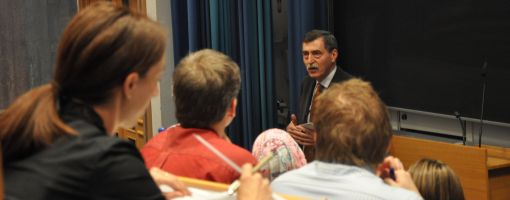
At a conference in Bergen 27 October, former UN Special Representative to Western Sahara aired his disappointment over the international communitys inability to solve the last colonial issue in Africa.
In a conference entitled Western Sahara; when international law meets Realpolitik, Francesco Bastagli, UN Special Representative in Western Sahara in 2005-2006, said that in dealing with the Western Sahara conflict, both the political organs of the United Nations and its Secretariat have been leaning towards Morocco's interests instead of complying with their obligations under the United Nations Charter and the requirements of international legality.
“Two-three countries are running the show on Western Sahara. It is essential and urgent that countries which are not so partial to Morocco due to historic, strategic or economic reasons, engage themselves in an open and participatory debate on Western Sahara”, stated Bastagli.
Governments such as Norway must do more than only urge the parties to find a solution; they should be more active and insist on law being fulfilled, he said.
He said that he began to raise concerns with the local authorities soon after taking office as Special Representative. This didn't go down well with Rabat, which asked for his removal. Albeit the Secretary General didn't accept the request, the Secretariat also proved reluctant to denounce Moroccan disregard for international norms. From human rights violations to the illicit exploitation of Western Sahara's natural resources through the fisheries agreement with the EU, inaction was the norm. On Western Sahara, the Secretariat has always tended to accommodate the wishes of Morocco`s patrons, Paris and Washington.
Sidi Mohammed Daddach, former Rafto Laureate outlined the difficult human rights situation for the Saharawi people. According to Daddach, the territory is sealed off for international observers.
"It is crucial that the referendum on independence takes place", Daddach stated. He underlined that the human rights defenders who have been jailed since the 2010 protest wave in Western Sahara must be released. 23 of them have been in jail for a year without a trial.
Hans Morten Haugen, PhD and Associate Professor at the Diakonhjemmet University College places Spain on top of the to-blame-list for the continuation of the status quo.
“As opposed to Portugal in East Timor, which brought the so-called Timor Gap Treaty to the International Court of Justice, Spain directly contributes to undermine the Saharawi people's rights. Spain promotes the fishing of Spanish and other European vessels outside Western Sahara, in clear contradiction to the Saharawis' wishes, interests and rights. Spain as the administering authority under the UN Charter Chapter XI, does not fulfil its international obligations in Western Sahara”, Haugen stated from a legal perspective.
Jennifer Murphy, PhD, James I University in Spain, with specialisation in the realpolitik of the Western Sahara conflict, places main emphasis on the French and American support to Morocco. “France actively participates in the conflict”, Murphy stated, underlining that the American approach has remained basically unchanged during the Obama administration.
The conference was co-organised by the UN Association of Norway, the Norwegian Students' and Academics' International Assistance Fund (SAIH) and the Norwegian Support Committee for Western Sahara. It was opened by Arne Øi, regional head of the office of the United Nations Association of Norway, Western Branch. Mr. Øi had just been an observer to the Western Sahara debates in the United Nations, where the territory is treated as the last unresolved colonial issue in Africa.
The Saharawi refugee Asria Mohamed read from her upcoming book, "Between the strong sand and the white snow lives my hope for a free Sahara".
During the same week, Daddach gave several other presentations in Bergen. He spoke for the Center for Middle Eastern Studies on 28 October, for the Labour Party on the 1 November, as well as at a screening of the Spanish documentary move El Problema on 27 October. Daddach is in Bergen to attend the 25th anniversary of the Rafto Foundation for Human Rights. Daddach won the Rafto Award in Bergen in 2002, after having spent 24 years in Moroccan jails.
The conference was made possible thanks to generous support from Norwegian Agency for Development Cooperation (Norad) and The Norwegian Confederation of Trade Unions (LO).
NY Check new Western Sahara poster!
“Try to Visit Western Sahara”…
The Security Council fails Western Sahara and international law
On 31 October 2025, a new resolution was adopted in the UN Security Council calling on the Saharawis to negotiate a solution that would entail their incorporation into the occupying power, Morocco.
Saharawis Demonstrate Against Trump Proposal
The United States has proposed in a meeting of the UN Security Council on Thursday that the occupied Western Sahara be incorporated into Morocco.
Skretting Turkey misled about sustainability
Dutch-Norwegian fish feed giant admits using conflict fishmeal from occupied Western Sahara. Last month, it removed a fake sustainability claim from its website.



